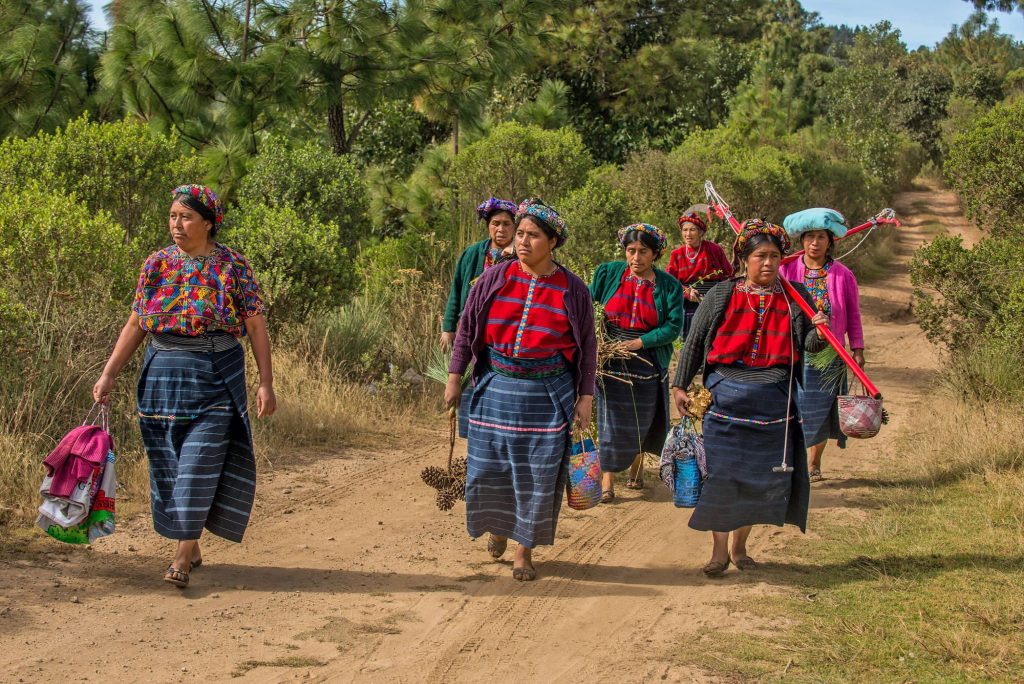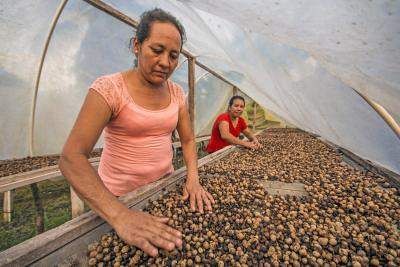Advancing the Human Rights of Rural People
8 min read
Human rights abuses—such as child labor, forced labor, poor working conditions, gender inequality, and the violation of Indigenous land rights—are persistent risks in many agricultural and forestry supply chains. The Rainforest Alliance works to protect and promote the human rights of farmers, farmworkers, and forest communities by implementing targeted strategies in both our certification program and our landscapes initiatives.
But of course, no single organization can overcome a challenge as complex and entrenched as human rights abuses. That’s why we also bring together a global alliance of rural communities, companies, governments, civil society organizations, and individuals around the world to advance responsible business practices and government policies. Everyone must do their part.
Sign up for useful tips to green your life and protect our planet.
Here are some human rights challenges that the Rainforest Alliance addresses through our work.
Child labor
160 million children worldwide are engaged in child labor—that’s more than the combined populations of the United Kingdom and Germany. The majority of these children—70 percent—work in the agricultural sector.
Child labor is not tolerated on Rainforest Alliance Certified farms. That said, our experience has shown that the threat of instant decertification often drives abuses underground, making them much harder to detect. That’s why the Rainforest Alliance Certification Program takes an “assess-and-address” approach that focuses on prevention, engagement, improvement, and incentivizing farm owners and management to tackle child labor. Farmers and farm groups in our certification program are required to conduct risk assessments; to implement mitigation activities for any risks they identify; and to monitor how effective these mitigation activities are. They must also identify cases of child labor and remediate them, and they have access to trainings on how to do so. This assess-and-address approach aligns with the UN Guiding Principles on Business and Human Rights and the OECD Guidelines for Multinational Enterprises.
Tackling child labor in our certification program is just one of the pathways we’re taking towards child labor-free farms. Raising community awareness, working with families, teachers, government agencies, and community institutions are among our other tools. Investing in women, influencing government action and partnering with companies are also important to stopping child labor.
Forced labor
Farm workers, especially migrant workers and people from historically marginalized social groups, are particularly vulnerable to forced labor. The hallmarks of forced labor include unpaid or extremely low-paid work, changes to working conditions without the worker’s consent, confinement in the workplace, and debt bondage.
As with child labor, forced labor is best tackled with an assess-and-address approach, since an outright ban, punishable by immediate decertification, often leads farm owners to hide incidents of forced labor instead of remediating them. Often the most effective approach to give the farm an opportunity to provide remedy to the victim and improve its prevention and mitigation systems. It should be said when assess-and-address yields no improvement, or when the human rights abuses (whether they be forced labor or other abuses) are severe, the Rainforest Alliance suspends or decertifies the farm or farm group in question.
In addition to the measures taken through our certification program, the Rainforest Alliance works with local actors to employ context-specific methods of combating forced labor. In Ghana, for example, we are working with an array of partners to protect migrants who are vulnerable to forced labor in cocoa and artisanal gold mining. In Mexico and Costa Rica, we are partnering with the labor-rights organization Stronger Together on the responsible recruitment of seasonal migrant workers in avocados, berries, bananas, and pineapples (these workers often depend on intermediaries to find work, which makes them vulnerable to fees and debt bondage). We’re adapting Stronger Together’s Responsible Recruitment Toolkit to this context, training farmers and labor providers to use the toolkit, and promoting responsible recruitment practices among governments, industry associations, and other stakeholders.
Working conditions
Dangerous and poor working conditions jeopardize the well-being of workers. Our standards include protections such as access to clean drinking water, adequate sanitation, and health care; maternity leave; and the right to freedom of association and collective bargaining.
Agrochemicals can pose a health risk to workers, so when agrochemicals absolutely must be used (the harshest are not allowed at all, and manual or biological methods are the first line of defense in our agricultural programs), workers must receive training on how to safely handle these substances, and personal protective equipment must be worn. A 2019 study by Wageningen University compared 13 Rainforest Alliance Certified banana farms to 16 non-certified farms in Colombia. Workers at certified farms were more likely to wear all their personal protective equipment. They also found that all certified farms surveyed had a designated occupational health professional, compared to only 19 percent of the non-certified farms.
Toward a living wage
Poverty is key among the many conditions that make workers vulnerable to exploitation and labor rights abuses. Sometimes workers can’t afford to turn down even the worst jobs; someone may accept a job offer far away, only to find out that the payment or conditions are not as promised—but the person is stuck, having no money for transportation to leave. On certified farms, employers must meet legal minimum wages and demonstrate progress toward paying a living wage—the amount of money a household needs to cover basic expenses, like housing and groceries, and put aside a little for emergencies (the amount varies according to the family’s specific location). The Global Living Wage Coalition, which the Rainforest Alliance co-founded and co-chairs, works to determine the living wage for workers, depending on sector and location.
But some farm owners have such a small margin of profit that they can’t afford to pay their workers a living wage. This is one reason the Rainforest Alliance works with companies, governments, and other NGOs, as the burden of providing a living income for farmers and paying workers a living wage must be shared across the entire supply chain.
Gender equality
Women play an essential role in rural economies: 64 percent of women in low-income countries and 42 percent in lower middle-income countries work in agriculture. Yet women seldom receive a fair share of resources and income, and globally less than 15 percent are landowners. On larger farms, women farmworkers often lack the right to maternity leave, childcare, and equal opportunities for advancement. Moreover, women can face gender-based violence and sexual harassment at the hands of superiors or other workers.

For years the Rainforest Alliance has worked with farmers and many other stakeholders to improve gender equality through certification, training, and advocacy. Our certification program requires equal pay for equal work and tackles discrimination and sexual harassment. Here, too, the program uses an assess-and-address approach, requiring farms and farm groups to appoint a person or committee to take charge of combating gender-based discrimination, sexual violence, and harassment. It also gives farms and companies tools to understand the gender gaps and issues in their operations and how to address them.
We also promote and measure women’s participation in our farmer training programs, which provide concrete instruction on best farming practices, climate-smart methods, financial literacy, and more. Women’s participation is just as central to our work with forest communities. In Guatemala and Mexico, we support women-run forest businesses and women’s leadership in forest enterprises.
Indigenous rights
Since its founding in 1987, the Rainforest Alliance has worked to uphold land rights for Indigenous peoples, who manage or own more than a third of the world’s remaining intact forests. The very first forestry standard, which was created in 1989 by the Forest Stewardship Council (FSC) (co-founded by the Rainforest Alliance) required land tenure to be clear, and to this day, a forestry operation with outstanding land claims or conflicts cannot achieve FSC certification.
The Rainforest Alliance also partners with Indigenous communities from the Amazon to Indonesia to cultivate strong local economies that are rooted in Indigenous values and traditions—and linked to the global marketplace. In the San Martín region of Peru, for example, we work with eight Indigenous communities to bring their more sustainable products—from coffee to cocoa to the medicinal sangre de grado—to market. We also provided training in business management and digital skills to Warmi Awadora, a collective of Kichwa women who create bags, belts, and necklaces using traditional weaving techniques. Being able to use social media and ship their products around the world was particularly crucial during the early pandemic, when tourism to their area declined sharply.
With thriving local economies, Indigenous communities can better withstand threats to their way of life and the health of their land.
Youth inclusion
More and more, rural young people who don’t see a viable livelihood in their communities are moving away to cities to seek work—leaving local family farms and forest businesses without the youthful energy and skills needed to carry on and flourish. The Rainforest Alliance provides rural youth with training, entrepreneurial skills, mentorships, and finance so they may develop profitable, more sustainable careers within their home communities, and help those communities innovate and thrive in today’s world. In Calakmul, Mexico, our longstanding Our Forest, Our Future program introduces young people to skills and jobs that not only allow them to avoid outmigration but to help conserve the local forest. In coffee- and tea-farming communities in East Africa’s Mount Kenya, where we are working to improve sustainability and climate resilience, we provide entrepreneurial training and access to finance to youth. We also work to ensure youth participation in the county-level land-management boards (communal decision-making governance structures) that we are supporting there to improve sustainability and community well-being. Working in partnership with a local organization in Jembrana, Bali, we launched a program to train young budding journalists to participate in a research program on cocoa and sustainability.
Improving human rights in agricultural and forestry supply chains requires collaboration beyond actors in supply chains. Governments, civil society, and communities should promote human rights through their own policies, programs, and actions—with organizations like the Rainforest Alliance playing an important convener role. Our strategic approach to sustainability transformation—including certification, company partnerships, landscape and community initiatives, and targeted government advocacy—are valuable tools for advancing human rights within the rural landscapes where we work.
Invest in the next critical decade
Help us scale, deepen, and accelerate our impact to protect the planet and our entire global family.





